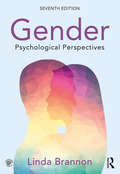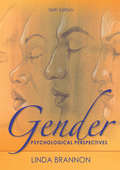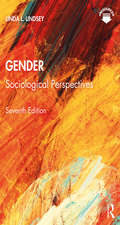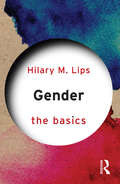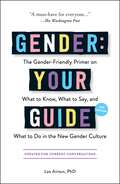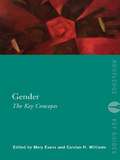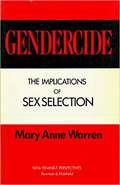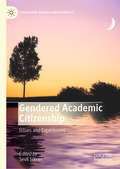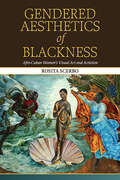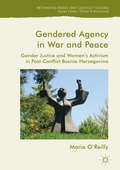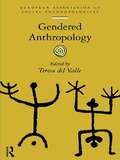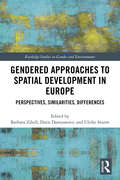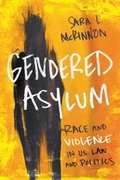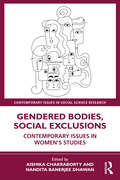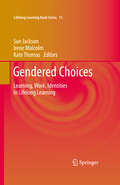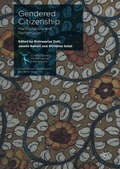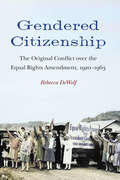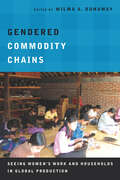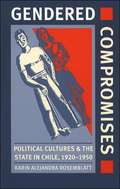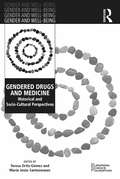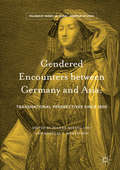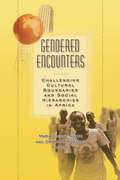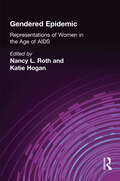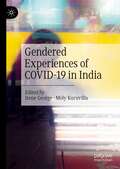- Table View
- List View
Gender: Psychological Perspectives, Seventh Edition
by Linda BrannonGender: Psychological Perspectives synthesizes the latest research on gender to help students think critically about the differences between research findings and stereotypes, provoking them to examine and revise their own preconceptions. The text examines the behavioral, biological, and social context in which women and men express gendered behaviors. The text’s unique pedagogical program helps students understand the portrayal of gender in the media and the application of gender research in the real world. Headlines from the news open each chapter to engage the reader. Gendered Voices present true personal accounts of people's lives. According to the Media boxes highlight gender-related coverage in newspapers, magazines, books, TV, and movies, while According to the Research boxes offer the latest scientifically based research to help students analyze the accuracy and fairness of gender images presented in the media. Additionally, Considering Diversity sections emphasize the cross-cultural perspective of gender. This text is intended for undergraduate or graduate courses on the psychology of gender, psychology of sex, psychology of women or men, gender issues, sex roles, women in society, and women’s or men’s studies. It is also applicable to sociology and anthropology courses on diversity. Seventh Edition Highlights: 12 new headlines on topics ranging from gender and the Flynn effect to gender stereotyping that affects men Coverage of gender issues in aging adults and transgendered individuals Expanded coverage of diversity issues in the US and around the globe, including the latest research from China, Japan, and Europe More tables, figures, and photos to provide summaries of text in an easy-to-absorb format End-of-chapter summaries and glossary Suggested readings for further exploration of chapter topics Companion website at www.routledge.com/cw/Brannon containing both instructor and student resources
Gender: Psychological Perspectives, Sixth Edition
by Linda BrannonThis bestselling text presents research about gender and helps students think critically about the differences between research findings and gender stereotypes. It examines the biology and social context in which women and men express gendered behaviors. Defining gender as the behaviors and attitudes that relate to (but are not entirely congruent with) biological sex, the book focuses on research and scholarship to provide the material for a critical review and an overall picture of gender from a psychological perspective. To highlight how research findings can relate to people's lives, the book supplements the review of scholarly research with personal, narrative accounts of gender-relevant aspects of people's lives. To emphasize the cross-cultural perspective of gender, the book including a section on diversity in most chapters but also weaves diversity issues throughout the text. The personal narrative and diversity highlights help to balance the research-based scholarship with the personal experience of gender.
Gender: Sociological Perspectives
by Linda L. LindseyA landmark publication in the social sciences, Linda Lindsey’s Gender is the most comprehensive textbook to explore gender sociologically, as a critical and fundamental dimension of a person’s identity, interactions, development, and role and status in society. Ranging in scope from the everyday lived experiences of individuals to the complex patterns and structures of gender that are produced by institutions in our global society, the book reveals how understandings of gender vary across time and place and shift along the intersecting lines of race, ethnicity, culture, sexuality, class and religion. Arriving at a time of enormous social change, the new, seventh edition extends its rigorous, theoretical approach to reflect on recent events and issues with insights that challenge conventional thought about the gender binary and the stereotypes that result. Recent and emerging topics that are investigated include the #MeToo and LGBTQ-rights movements, political misogyny in the Trump era, norms of masculinity, marriage and family formation, resurgent feminist activism and praxis, the gendered workplace, and profound consequences of neoliberal globalization. Enriching its sociological approach with interdisciplinary insight from feminist, biological, psychological, historical, and anthropological perspectives, the new edition of Gender provides a balanced and broad approach with readable, dynamic content that furthers student understanding, both of the importance of gender and how it shapes individual trajectories and social processes in the U.S. and across the globe.
Gender: The Basics
by Hilary LipsGender: The Basics is an engaging introduction which examines the impact of cultural, historical, biological, psychological and economic forces on qualities which have come to be defined as masculine or feminine. Highlighting that there is far more to gender than biological sex, it takes a global perspective to examine the interaction between gender and a wide range of topics including: • Relationships, intimacy and concepts of sexuality • The workplace and labour markets • Gender related violence and war • Public health, poverty and development • The ageing process Supporting theory with examples and case studies from a variety of contexts, suggestions for further reading and a detailed glossary, this text is an essential read for anyone approaching the study of gender for the first time.
Gender: The Gender-Friendly Primer on What to Know, What to Say, and What to Do in the New Gender Culture
by Lee AirtonBe a part of the ever-evolving conversation around gender and discover how to navigate gender diversity in today&’s families, communities, and workplaces in this updated edition that is &“an invaluable resource for both new and veteran allies&” (Library Journal, starred review).Gender is now a global conversation, and one that is constantly evolving. More people than ever before are openly living their lives as transgender men or women, and many transgender people are coming out as neither men nor women, instead living outside the binary. Gender is changing, and this change is gaining momentum. From the differences among gender identity, gender expression, and sex, to the use of gender-neutral pronouns like singular they/them to thinking about your own participation in gender, Gender: Your Guide, 2nd Edition serves as a complete primer to all things gender. Guided by professor and gender diversity advocate Lee Airton, PhD, learn how gender works in everyday life; how to use accurate terminology to refer to transgender, nonbinary, and/or gender nonconforming individuals; and how to ask when you aren&’t sure what to do or say. It provides you with the information you need to talk confidently and compassionately about gender diversity, whether simply having a conversation or going to bat as an advocate. In this updated edition, Dr. Airton explores updated definitions of intersex people, conversion therapy bans, transgender students in sports, online and social community discussions, updated pop culture references, and much more. Just like gender itself, being gender-friendly is a process for all of us. Gender: Your Guide, 2nd Edition invites everyone on board to make gender more flexible and less constricting: a source of more joy, and less harm, for everyone.
Gender: The Key Concepts (Routledge Key Guides)
by Mary Evans Carolyn H. WilliamsThis invaluable volume provides an overview of 37 terms, theories and concepts frequently used in gender studies which those studying the subject can find difficult to grasp. Each entry provides a critical definition of the concept, examining the background to the idea, its usage and the major figures associated with the term. Taking a truly interdisciplinary and global view of gender studies, concepts covered include: Agency Diaspora Heteronormativity Subjectivity Performativity Class Feminist Politics Body Gender identity Reflexivity. With cross referencing and further reading provided throughout the text, Gender: The Key Concepts unweaves the relationships between different aspects of the field defined as gender studies, and is essential for all those studying gender in interdisciplinary contexts as undergraduates, postgraduates and beyond.
Gendercide: The Implications Of Sex Selection (New Feminist Perspectives)
by Mary E. WarrenIn this thought-provoking feminist study of the moral issues raised by new and emerging technologies of sex selection, Mary Anne Warren shows that these technologies could substantially undermine and ultimately reverse the progress women have made in today's society.
Gendered Academic Citizenship: Issues and Experiences (Citizenship, Gender and Diversity)
by Sevil SümerThis book proposes the framework of gendered academic citizenship to capture the multidimensional and complex dynamics of power relations and everyday practices in the contemporary context of academic capitalism. The book proposes an innovative definition of academic citizenship as involving three key components: membership, recognition and belonging. Based on new empirical data, it identifies four ideal-types of academic citizenship: full, limited, transitional citizenship and non-citizenship. The different chapters of the book provide comprehensive reviews of the relevant research literature and offer original insights into the patterns of gender inequalities and practices of gendered academic citizenship across and within different national contexts. The book concludes by setting a comprehensive research agenda for the future. This book will be of interest to academic researchers and students at all levels in the disciplines of sociology, gender studies, higher education, political science and cultural anthropology.
Gendered Aesthetics of Blackness: Afro-Cuban Women's Visual Art and Activism (SUNY series, Afro-Latinx Futures)
by Rosita ScerboExplores how Afro-Cuban women's visual art challenges dominant narratives of race, gender, and identity.Gendered Aesthetics of Blackness delves deeply into the visual artistry and activism of Afro-Cuban women in Cuba and the United States. Influential in their communities yet overlooked in the mainstream art world and academic discourse, Harmonia Rosales, María Magdalena Campos-Pons, Belkis Ayón, and Susana Pilar practice what Rosita Scerbo calls "Decolonial AfroARTivism." These women use their art to challenge and disrupt dominant narratives, reclaim their identities and cultural heritage, and advocate for social justice. In centering their voices and meticulously analyzing their works, Scerbo not only enriches our understanding of Afro-Cuban visual culture but also pushes the boundaries of research. Groundbreaking in its decolonial approach and form, Gendered Aesthetics of Blackness engages a wide swath of sources and includes two interviews, with Rosales and with curator and popular educator Diarenis Calderon Tartabull.
Gendered Agency in War and Peace
by Maria O’ReillyThis book examines how gendered agency emerges in peacebuilding contexts. It develops a feminist critique of the international peacebuilding interventions, through a study of transitional justice policies and practices implemented in Bosnia & Herzegovina, and local activists’ responses to official discourses surrounding them. Extending Nancy Fraser’s tripartite model of justice to peacebuilding contexts, the book also advances notions of recognition, redistribution and representation as crucial components of gender-just peace. It argues that recognising women as victims and survivors of conflict, achieving a gender-equitable distribution of material and symbolic resources, and enabling women to participate as agents of transitional justice processes, are all essential for transforming the structural inequalities that enable gender violence and discrimination to materialise before, during, and after conflict. This study establishes a new avenue of analysis for understanding responses and resistances to international peacebuilding, by offering a sustained engagement with feminist social and political theory.
Gendered Agents: Women and Institutional Knowledge
by Paul A. Bové Silvestra BovéGendered Agents, edited by Silvestra Mariniello andPaul A. Bové, presents essays by influential feminist theorists who challenge traditional Western epistemology and suggest new directions for feminism. By examining both literary and historical discourses, such critics as Gayatri Spivak, Hortense Spillers, and Lauren Berlant assess questions of sexuality, ethics, race, psychoanalysis, subjectivity, and identity.Gathered from various issues of the journal boundary 2, the essays in Gendered Agents seek to transform the model of Western academic knowledge by restructuring its priorities and values. In the introduction, Mariniello urges feminists to begin anew but take as their starting place the achievements of feminism and feminist theory: an understanding of language that considers the implications of silence, the motivation to decompartmentalize experience, and the acknowledgement that everything is political. Challenging both a canonical organization of knowledge and the persistently self-referential "ghettoization" of feminism, contributors subsequently tackle subjects as diverse as pre-Marxist France, the American fetus, black intellectuals, queer nationality, and the art of literary interpretation.Contributors. Lauren Berlant, Karen Brennan, Margaret Cohen, Nancy Fraser, Elizabeth Freeman, Carol Jacobs, Silvestra Mariniello, Larysa Mykyta, Laura Rice, Ivy Schweitzer, Doris Sommer, Hortense J. Spillers, Gayatri Chakravorty Spivak, Judith Wilt
Gendered Anthropology (European Association of Social Anthropologists)
by Teresa Del ValleIn the last three decades, a remarkable degree of progress has occurred in the study of gender within anthropology. Gendered Anthropology offers a thought-provoking, lively examination of current debates focusing on sex and gender, race, ethnicity, politics and economics and provides insights which are still too often lacking in mainstream anthropology. Gendered Anthropology will be of particular value to undergraduates and lecturers in social anthropology and gender studies.
Gendered Approaches to Spatial Development in Europe: Perspectives, Similarities, Differences (Routledge Studies in Gender and Environments)
by Barbara Zibell Doris Damyanovic Ulrike SturmThis book explores the extent to which gendered approaches are evident and effective in spatial development in selected European countries. Beginning with an introduction to theories and concepts of gender, space and development, the book includes a brief historical review of gender in spatial planning and development throughout Europe in general, and an overview of different national frameworks in European countries, comparing legal, organisational and cultural similarities and differences. This is followed by a critical reflection on how simplifications and stereotypes of gender concepts are used in the practice of spatial development. The main part of the book offers a transnational discussion of planning practices on selected thematic topics. It starts with gender-sensitivity in urban master planning and at neighbourhood level referring to different types of planning manuals. Furthermore, the book focuses on gender-sensitive evaluation in urban planning as well as international agendas for sustainable development as a framework for a new generation of gender equality policies. The chapter authors assert that climate change, migration and austerity have threatened gender equality and therefore spatial development needs to be especially alert to gender dimensions. The editors end with an outlook and suggestions for further action and research on gender issues in spatial development. With inputs from some of Europe’s leading thinkers on gender, space and development, this volume is designed to inspire students, scholars and practitioners to reflect upon the contribution that gendered approaches can make in the various fields of spatial development and environmental planning.
Gendered Asylum: Race and Violence in U.S. Law and Politics
by Sara L MckinnonWomen filing gender-based asylum claims long faced skepticism and outright rejection within the U.S. immigration system. Despite erratic progress, the United States still fails to recognize gender as an established category for experiencing persecution. Gender exists in a sort of limbo segregated from other aspects of identity and experience. Sara L. McKinnon exposes racialized rhetorics of violence in politics and charts the development of gender as a category in U.S. asylum law. Starting with the late 1980s, when gender-based requests first emerged in case law, McKinnon analyzes gender and sexuality-related cases against the backdrop of national and transnational politics. Her focus falls on cases as diverse as Guatemalan and Salvadoran women sexually abused during the Dirty Wars and transgender asylum seekers from around the world fleeing brutally violent situations. She reviews the claims, evidence, testimony, and message strategies that unfolded in these legal arguments and decisions, and illuminates how legal decisions turned gender into a political construct vulnerable to U.S. national and global interests. She also explores myriad related aspects of the process, including how subjects are racialized and the effects of that racialization, and the consequences of policies that position gender as a signifier for women via normative assumptions about sex and heterosexuality.
Gendered Bodies, Social Exclusions: Contemporary Issues in Women's Studies (Contemporary Issues in Social Science Research)
by Aishika Chakraborty and Nandita Banerjee DhawanThis book explores contemporary issues in women’s studies, focusing on the agency of marginalised and disenfranchised within political, cultural, and social spheres. It employs feminist pedagogies to articulate the multiple intersecting histories of class, caste, race, sexuality, disability and citizenship. Using feminist perspectives, the book challenges the hegemonic and patriarchal logic of heteronormativity by contextualizing verbal abuse, violence in the private sphere, and the tensions between women's and men's rights across the continuum of family, community, and state. The essays in this volume examine the (im)possibilities of creating violence-free, caring, and affordable living space on the one hand, and seek to understand the gendered experience of violence in the context of migration, as well as cultural and sexual labour on the other. In addition to interrogating the cultural taboos that restrict women's autonomy and rights, the essays prioritise a diverse range of voices, including those of dancers in the entertainment industry, sexual and gender minorities, urban poor populations living in slums, and disabled women. They also document and archive the academic agency of staff and students working to address injustices within higher education institutions. Part of the Contemporary Issues in Social Science Research series, this volume will be of significant interest to scholars and researchers in gender studies, women’s studies, history, political science, sociology, social anthropology, development studies, law, media studies and South Asia studies.
Gendered Choices
by Kate Thomas Sue Jackson Irene MalcolmThis important book breaks new ground in addressing issues of gendered learning in different contexts across the (adult) life span at the start of the 21st century. Adult learning sits within a shifting landscape of educational policy, profoundly influenced by the skills agenda, by complex funding policies, new qualifications and the widening/narrowing participation debate. The book is unique in highlighting the centrality of gendered choices to these developments which shape participation in and experiences of lifelong learning. Gendered Choices critically examines the continued expansion of a skills-based approach in areas of lifelong learning, including career decisions, professional identities and informal networks. It explores key intersections of adult learning from a gender perspective: notably participation, workplace learning and informal pathways. Drawing on research from a range of contexts, Gendered Choices demonstrates that for women the public/private spaces of work and home are often conflated, although the gendering of 'choice' has largely been ignored by policy makers. The themes of the book bring together some of these critical issues, explored through the multiple and fractured identities which constitute gendered lives. The book addresses these in an international context, with contributions from Canada, Spain and Iran that provide a wider international perspective on shared issues.
Gendered Citizenship
by Janelle Reinelt Bishnupriya Dutt Shrinkhla SahaiThis book explores how citizenship is differently gendered and performed across national and regional boundaries. Using 'citizenship' as its organizing concept, it is a collection of multidisciplinary approaches to legal, socio-cultural and performative aspects of gender construction and identity: violence against women, victimhood and agency, and everyday issues of socialization in a globalized world. It brings together scholars of politics, media, and performance who are committed to dialogue across both nation and discipline. This study is the culmination of a two-year project on the topic of 'Gendered Citizenship', arising from an international collaboration that has sought to develop a comparative and yet singular perspective on performance in relation to key political themes facing our countries of origin in the early decades of this century. The research is interdisciplinary and multinational, drawing on Indian, European, and North and South America n contexts.
Gendered Citizenship: The Original Conflict over the Equal Rights Amendment, 1920–1963
by Rebecca DeWolfBy engaging deeply with American legal and political history as well as the increasingly rich material on gender history, Gendered Citizenship illuminates the ideological contours of the original struggle over the Equal Rights Amendment (ERA) from 1920 to 1963. As the first comprehensive, full-length history of that struggle, this study grapples not only with the battle over women&’s constitutional status but also with the more than forty-year mission to articulate the boundaries of what it means to be an American citizen. Through an examination of an array of primary source materials, Gendered Citizenship contends that the original ERA conflict is best understood as the terrain that allowed Americans to reconceptualize citizenship to correspond with women&’s changing status after the passage of the Nineteenth Amendment. Finally, Rebecca DeWolf considers the struggle over the ERA in a new light: focusing not on the familiar theme of why the ERA failed to gain enactment, but on how the debates transcended traditional liberal versus conservative disputes in early to mid-twentieth-century America. The conflict, DeWolf reveals, ultimately became the defining narrative for the changing nature of American citizenship in the era.
Gendered Commodity Chains: Seeing Women's Work and Households in Global Production
by Wilma A. DunawayGendered Commodity Chains is the first book to consider the fundamental role of gender in global commodity chains. It challenges long-held assumptions of global economic systems by identifying the crucial role social reproduction plays in production and by declaring the household as an important site of production. In affirming the importance of women's work in global production, this cutting-edge volume fills an important gender gap in the field of global commodity and value chain analysis. With thirteen chapters by an international group of scholars from sociology, anthropology, economics, women's studies, and geography, this volume begins with an eye-opening feminist critique of existing commodity chain literature. Throughout its remaining five parts, Gendered Commodity Chains addresses ways women's work can be integrated into commodity chain research, the forms women's labor takes, threats to social reproduction, the impact of indigenous and peasant households on commodity chains, the rapidly expanding arenas of global carework and sex trafficking, and finally, opportunities for worker resistance. This broadly interdisciplinary volume provides conceptual and methodological guides for academics, graduate students, researchers, and activists interested in the gendered nature of commodity chains.
Gendered Compromises
by Karin Alejandra RosemblattWith this book, Karin Rosemblatt presents a gendered history of the politics and political compromise that emerged in Chile during the 1930s and 1940s, when reformist popular-front coalitions held power. While other scholars have focused on the economic realignments and novel political pacts that characterized Chilean politics during this era, Rosemblatt explores how gender helped shape Chile's evolving national identity. Rosemblatt examines how and why the aims of feminists, socialists, labor activists, social workers, physicians, and political leaders converged around a shared gender ideology. Tracing the complex negotiations surrounding the implementation of new labor, health, and welfare policies, she shows that professionals in health and welfare agencies sought to regulate gender and sexuality within the working class and to consolidate the male-led nuclear family as the basis of societal stability. Leftists collaborated in these efforts because they felt that strong family bonds would generate a sense of class belonging and help unify the Left, while feminists perceived male familial responsibility as beneficial for women. Diverse actors within civil society thus reworked the norms of masculinity and femininity developed by state agencies and political leaders--even as others challenged those ideals.
Gendered Drugs and Medicine: Historical and Socio-Cultural Perspectives (Gender and Well-Being)
by María Jesús Santesmases Teresa Ortiz-GomezDrugs are considered to be healers and harmers, wonder substances and knowledge makers; objects that impact on social hierarchies, health practices and public policies. As a collective endeavour, this book focuses on the ways that gender, along with race/ethnicity and class, influence the design, standardisation and circulation of drugs throughout several highly medicalised countries throughout the twentieth century and until the twenty-first. Fourteen authors from different European and non-European countries analyse the extent to which the dominant ideas and values surrounding masculinity and femininity have contributed to shape the research, prescription and use of drugs by women and men within particular social and cultural contexts. New and lesser-known, gender-specific issues in lifestyles and social practices associated with pharmaceutical technologies are analysed, as is the manner in which they intervene in life experiences such as reproduction, sexual desire, childbirth, depression and happiness. The processes of prescribing, selling, marketing and accepting or forbidding drugs is also examined, as is the contribution of gendered medical practices to the medicalisation and growing consumption of drugs by women. Gender relations and other hierarchies are involved as both causes and consequences of drug cultures, and of the history and social life of gender in contemporary drug production, use and consumption. A network of agents emerges from this book’s research, contributing to a better understanding of both gender and drugs within our society.
Gendered Encounters between Germany and Asia
by Joanne Miyang Cho Douglas T. McgetchinThis volume provides new insights into gendered interactions over the past two centuries between Germany and Asia, including India, China, Japan, and previously overlooked Asian countries including Vietnam, the Philippines, Thailand, and Korea. This volume presents scholarship from academics working in the field of German-Asian Studies as it relates to gender across transnational encounters in the nineteenth and twentieth centuries. Gender has been a lens of analysis in isolated published chapters in previous edited volumes on German-Asian connections, but nowhere has there been a volume specifically dedicated to the analysis of gender in this field. Rejecting traditional notions of West and East as seeming polar opposites, their contributions to this volume attempts to reconstruct the ways in which German and Asian men and women have cooperated and negotiated the challenge of modernity in various fields.
Gendered Encounters: Challenging Cultural Boundaries and Social Hierarchies in Africa
by Maria Grosz-Ngaté Omari H. KokoleThis book makes a significant contribution to contemporary debates on "globalization," culture and gender. Focusing on intersections of the local and the global in Africa, contributors elucidate how translocal and transnational cultural currents are mediated by gender, how they reshape gender constructs and relations, and how they both manifest and impinge on relations of power.
Gendered Epidemic: Representations of Women in the Age of AIDS
by Nancy L. Roth Katie HoganFirst Published in 1998. Routledge is an imprint of Taylor & Francis, an informa company.
Gendered Experiences of COVID-19 in India
by Irene George Moly KuruvillaThis edited volume critically reflects on the ways in which the COVID-19 pandemic has affected and continues to affect women in India. Drawing on a range of qualitative and quantitative research, contributors analyze the implications of the pandemic on the informal sector, migrant women workers, women in the health care sector, women’s economic engagement, the experiences of elderly women, mental health care, higher education, and more. Chapters also consider what gender-responsive policies are needed to ensure women’s equal rights, representation, and participation in society during and after the COVID-19 pandemic. This timely and relevant volume situates India within the larger global context of conversations around economic, social and political consequences of the pandemic upon gender inequalities This book will be of interest to scholars, students, and policy makers in the fields of Sociology, Gender Studies, and Public and Social Policy.
